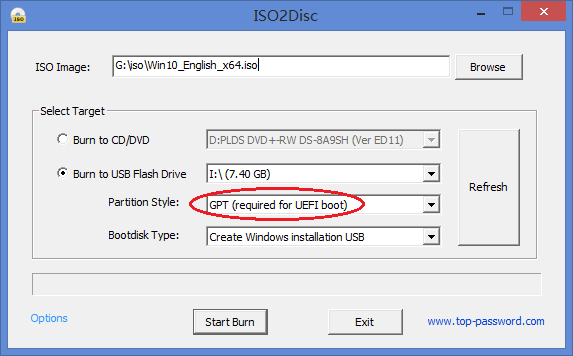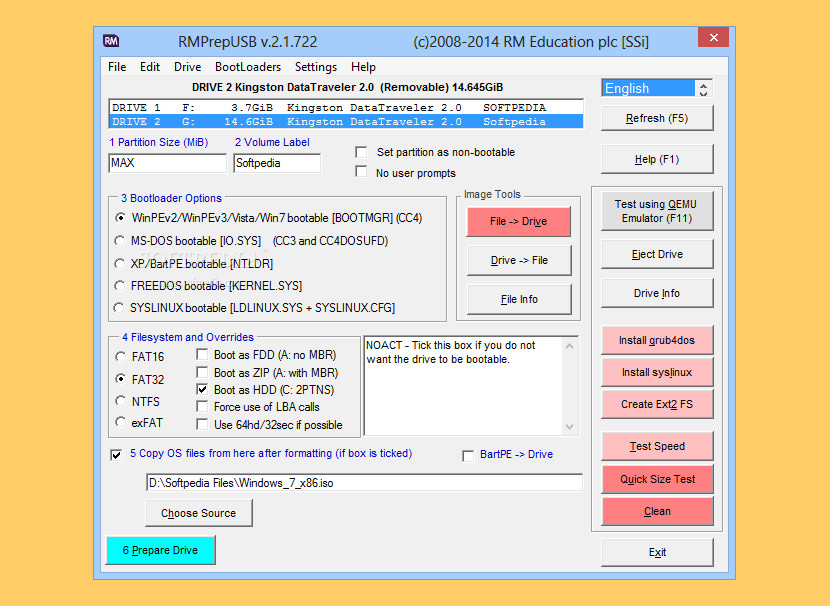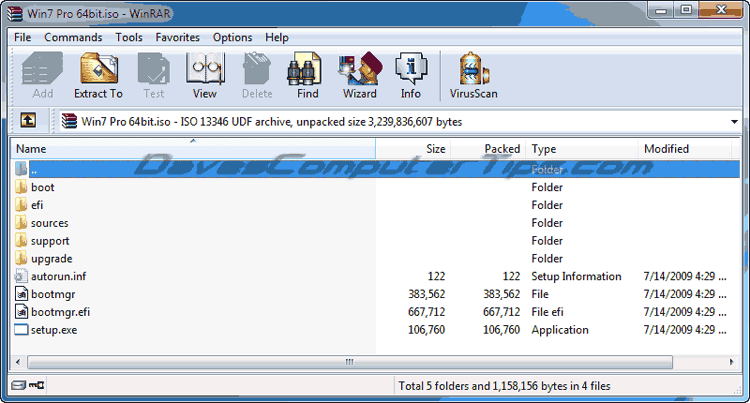

- #Create bootable usb windows 7 from windows 10 without iso install
- #Create bootable usb windows 7 from windows 10 without iso zip file
- #Create bootable usb windows 7 from windows 10 without iso full
- #Create bootable usb windows 7 from windows 10 without iso software
- #Create bootable usb windows 7 from windows 10 without iso iso
This is turned off by default to prevent the novice from mistakenly selecting and wiping a wrong device, such as a USB connected backup hard drive. List fixed (non flash) or unpartitioned USB disks. If you click on the Format Options button just above the visible check boxes you will get the extra syslinux format options in the relevant drop down box, plus 3 more options and check boxes.
#Create bootable usb windows 7 from windows 10 without iso full
If you are making a USB/SD for installing an OS on machines in full GPT/UEFI mode, then yes go with that option in Rufus. We actually can't tell you when the other options may be essential and can only suggest that if you are having problems on the latest UEFI and GPT configured hardware that you give them a try.

MBR partition scheme for BIOS or UEFI computers.Īt present this option is best left as is because it is suitable for most current PCs and will allow the stick or card to work in the majority of machines it is plugged into. So instead of the standard hard drive icon and a max of only 11 characters for the volume label, the icon will be that of a USB key and the label can be as long as we want. This option changes the way the drive will be shown in Windows. A few other options may not be immediately obvious to average users.

#Create bootable usb windows 7 from windows 10 without iso iso
Some of the options are self explanatory and the File System and Cluster Size options we can leave to Rufus to select the default setting for each ISO file we give it. If we are adding persistence to a Linux operating system then we might want to give it extra space if we plan installing a lot of software, or accumulating personal files and data.
#Create bootable usb windows 7 from windows 10 without iso install
A Linux install disk and live OS should be able to make do on 2gigs, and for a Windows install disk we will need at least 4gig. Most of our utilities and single purpose tools will fit on sticks of 1gig or less. It would feel wasteful to use a 4gig USB stick for something that would fit on a 256mb one, so if you have any unused small capacity USB sticks languishing in a drawer then perhaps you can make use of them again, but bear in mind they may be slower than a more recent one. A Linux live or install USB/SD should take but a minute or four, and the USB/SD equivalent of a full Windows install DVD will take several minutes, give or take. Something as small as Gparted is not going to take very long and in our example the whole thing was over in 12 seconds. The Rufus app is portable, which means it is stand-alone and does not install anything in Windows, just start the downloaded. Rule of thumb is if you are in any doubt about an option then leave it on default. There is also the ability to create a DOS or Syslinux boot device for the tech-guys, plus a few other options that may be useful in various circumstances. Rufus is equally adept at making both Windows and Linux USB/SD operating system installation media and versions of their recovery disks. This is called adding Persistence and is not currently an option in Rufus-v1.3.4.270 but our other recommended tools listed below have various abilities to add persistence in certain circumstances. The first of our favored Windows tools for the job is Rufus, which has a familiar and uncluttered interface and can do all of the above mentioned things for us, with the exception of giving a Live Linux operating system the ability to retain changes after a reboot.

Rufus ( Reliable USB Formatting Utility (with Source) Many 'Live' Linux operating systems can, when on a flash memory device, retain settings and installed apps after a reboot, which along with the ability to work on most standard PCs you plug them into means you can take an operating system with you. It is also possible to run a full operating system from a USB stick or memory card, thereby letting us try out dual-multibooting without having to make any changes to a machine's onboard hard drive or operating system.
#Create bootable usb windows 7 from windows 10 without iso software
We can run software completely independently of a machine's onboard operating system, which allows us to run apps and utilities for partitioning, cloning, imaging and backup, as well as tools for recovery and repair. Fortunately there are a few utilities around that can do all of this for us in a single operation.īootable flash devices can be used to install an operating system, which can be particularly useful on a machine that does not have an optical drive. To create a bootable flash device from an ISO file we have to make sure our USB stick or SD memory card is indeed bootable by being partitioned and formatted correctly before we extract and copy all of the individual files to the device.
#Create bootable usb windows 7 from windows 10 without iso zip file
ISO image file is similar to a Zip file in that it holds many separate files that have been packaged up into a single file. Make a Bootable USB/SD Flash Device from an ISO Image FileĪn.


 0 kommentar(er)
0 kommentar(er)
